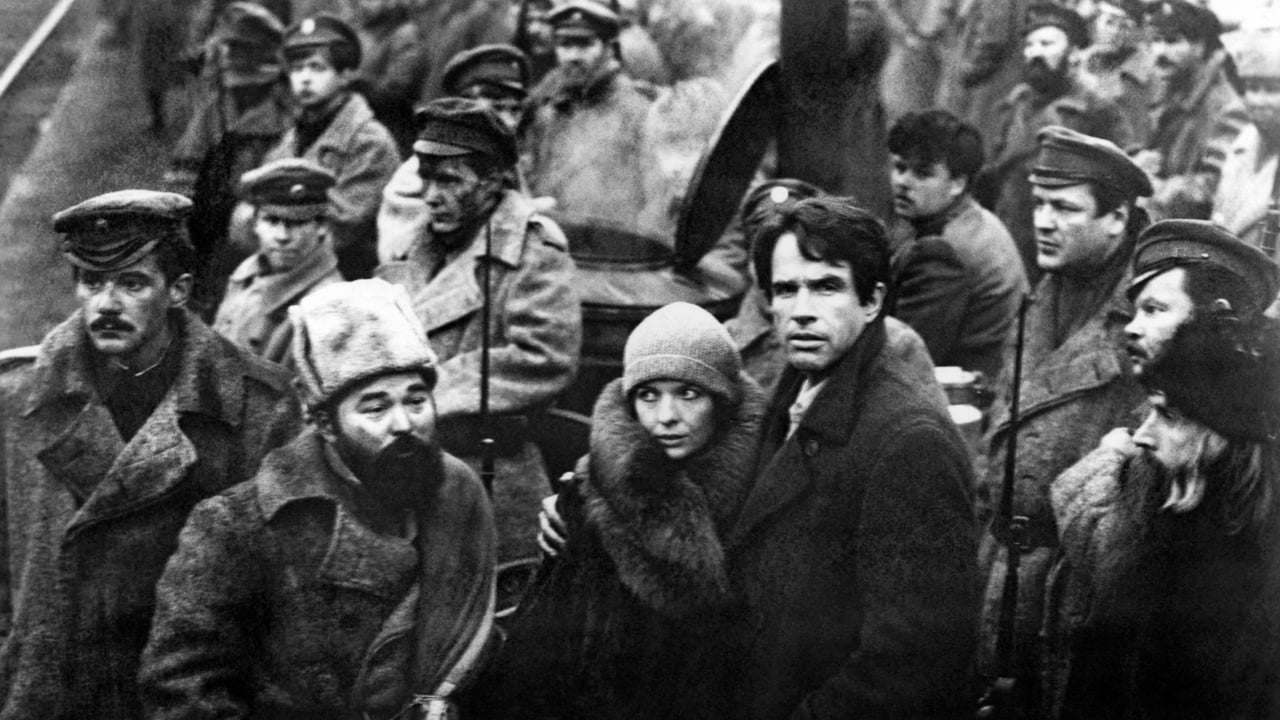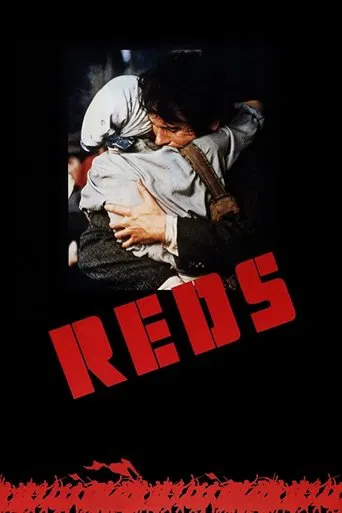

Some things I liked some I did not.
... View MoreDid you people see the same film I saw?
... View MoreA film of deceptively outspoken contemporary relevance, this is cinema at its most alert, alarming and alive.
... View MoreStrong acting helps the film overcome an uncertain premise and create characters that hold our attention absolutely.
... View MoreI recently stumbled over this film, which I saw when it came out, many galaxies ago. I only remembered that I saw it because, at the time, I thought Whatshisname was handsome.In tried to watch it again and was reminded why my mind wisely chose to delete it. This is nothing but a Hollywood lefty's Ode to Communism. This is the kind of film that historically-clueless, knee-jerk "Social Justice Warriors," Hollywood elites, and other assorted commies love to drool about. I can see any specimen in the leftist menagerie go into rapturous convulsions while watching this 4-hour yawner, some in the private theaters of their posh mansions.So unless you're a Communism fan/apologist avoid this interminable propaganda piece. Pick up a history book, instead. Preferably one that has not been revised by our Ministry of Truth (i.e. our so-called education system).
... View MoreThis is one of those great epic movies that for mysterious reasons are never shown on TV and are pretty much forgotten / unknown by the general public. It manages to mix successfully a love story with its turbulent historical background, in a way that I found even more convincing and less sentimental than Doctor Zhivago.I had the chance to watch it again after many years and I was truly surprised by how good it still is. It tells the story of John Reed - one of the very few foreigners buried in the Kremlin - and his turbulent relation with Louise Bryant. Particularly moving are the interviews with the "witnesses" that form the backbone of the movie. These people were Reed and Bryant's contemporaries, all in their late 70s/early 80s when the movie was shot, and some admit candidly to hardly remember Reed and Bryant.The movie starts with some witnesses speaking and then we are shown Reed and Bryant's first, awkward meeting, while Bryant was still married to her first husband. Soon the two move together in New York, while the anti-war movement is campaigning against the US entering WWI.Reed had already an adventurous past as field journalist and decided that WWI was a capitalistic war. He was intrigued by the Russian events in 1917 and managed to be in Moscow during the turbulent days of the Bolshevik revolution. Bryant - who had married him in the meanwhile - was with him. They both wrote books about those adventurous days.Back in the US the couple split up, with Reed wanting to be more involved with the Communist party and Bryant not so keen. There were also infidelities on both sides, hers with Eugene O'Neill. It was quite moving to see young Keaton and Nicholson playing Bryant and O'Neill. It made me think of their uneasy romance in "Something's got to give"...Anyway, Reed ends up in Russia again in 1919 and then imprisoned in Finland for wanting to leave Russia. Bryant decides to help him and starts an epically dangerous journey. In the meantime, Reed has been freed and is forced to campaign in the USSR, while his health is slowly deteriorating. When the two finally meet at Moscow station, you have a truly moving moment, not exploited in any sugary, sentimental way. The bitter end is however around the corner.Definitely Beatty best work, both as an actor and as a director - for which he got a well deserved Oscar. Keaton also deserved it, for her portrayal of Bryant. She was nominated but the Oscar for leading actress went to Katharine Hepburn. In the same year the other contenders were Streep and Sarandon - some fierce competition, not like nowadays.... The movie was robbed from winning best picture by the more conventional "Chariots of fire".
... View MoreRELEASED IN 1981 and written & directed by Warren Beatty, "Reds" stars Beatty as real-life radical American journalist and socialist, John "Jack" Reed, who becomes involved with the Russian revolution, and hopes to bring its spirit and idealism to America. In the meantime he romances "progressive" writer Louise Bryant (Diane Keaton), who also goes to Russia. Jack Nicholson plays the wrench in their romantic wheels, Eugene O'Neill. Maureen Stapleton & Gene Hackman are also on hand.Throughout the movie there are interjections from aged people who actually knew John Reed, Louise Bryant and Eugene O'Neill. I found this an interesting touch.The first hour and twenty minutes take place in the states during WWI, starting in Portland, Oregon, and then switching to the East Coast when the couple decides to move there (New York City & Provincetown, Massachusetts). Only then do events start to perk-up when they head to France and then Russia. Until that point there's a lot of relationship shenanigans between the three (Jack, Louise & Gene) and endless talk about communism, socialist ideals and workers' rights.The tone of the drama is akin to a Robert Altman film; you can tell Beatty learned a thing or two from him with "McCabe & Mrs. Miller" (1971). The movie's certainly ambitious and well-acted. Those with interest in the period will find much to like here. Unfortunately, it's not all that compelling and it lacks the epic stature, nigh-surrealism and jaw-dropping cinematography of "Dr. Zhivago" (1965). Reed's a misguided character because his communistic ideals proved to be a nightmare for the Russian people. To the film's credit, this is effectively shown in the last act in a potent discussion between Reed and Emma (Stapleton) yet, even then, Reed didn't "get" it, which is typically the case with boneheaded libertines who insist on forcing their fatally flawed ideology on the rest of the populace.While communism sounds good on paper, it just doesn't work in practice. It's a demotivating system that ensures that everyone's equally poor, except of course for the ruling state class, which essentially becomes communistic royalty. To all intents and purposes they are the reviled "bourgeoisie" and the common people are the "proletariat," both of which communism sought to eliminate in the first place, which makes communism hypocritical. Furthermore, communism leads to all kinds of suffering and corruption, like waiting in long lines or bribing doctors and sellers for services & merchandise, not to mention how the state itself becomes "god" and thus demands the 'worship' of the people. Sure, capitalism has its downside, but it's an all-around superior system, which is why people from communistic states flee to capitalistic countries and not vice versa.The temperamental and non-traditional Louise Bryant has her points of interest, but ultimately she isn't a sympathetic character (for one thing, she's duplicitous). Not for a second do I believe that she bluntly said to Reed in the yard outside a lecture hall: "Jack, I want to see you with your pants down" (rolling my eyes).THE MOVIE RUNS 195 minutes (3 hours, 15 minutes) and was shot in England, Finland, New York City, California, Spain and Sweden. ADDITIONAL WRITER: Trevor Griffiths.GRADE: C
... View MoreWhy watch this chunk of celluloid trash? Because it will help you to understand why so many otherwise intelligent people still fall for the false religion of looting and genocide known as socialism/communism.The 'interviews' with 'survivors' - a polite way of describing decrepit 20s anarchists - who gas off about the virtues of communism is enlightening and chilling. These mindwashed dupes tell you communism is peachy keen but for some strange reason don't mention firing squads, brainwashing, gulags, hanging people on meathooks in the basement of Lubyanka Prison, the Holodmor Famine in the Ukraine, contaminated drinking water, filth, corruption, beatings, true environmental disasters, and other routine features of communist third world toilets.Ask anyone in Cuba, North Korea, or communist china - that's right I said it, 'communist china' - about the lovely paradise of the workers. Take a look at these interviewees: old before their time, raspy cigarette voices, lousy teeth, chicken skin: don't you want to be a commie just like them? Yeah. Can't wait.They're just bright enough to be dangerous and all they can do when not throwing bombs is lie, lie, lie, and thrust their dirty fists in the air in worship of marx, lenin, stalin and other human garbage who would repay their moronic loyalty with death.You like stereotypes? Then you gonna love Reds. It has more stereotypes than a Chernobyl junkyard dog has three headed fleas: anti-communists are either stupid and toothless or 'rich, white' arrogant toffs. The communist rats are all lovely, wonderful, smart people who are always partying and enjoying life.Which doesn't explain why they croak of easily avoidable fatal illnesses at unusually young ages.To understand diseases, medical researchers must examine chunks of wino vomit, fly eggs, body lice, open lesions, necrotic tissue, decomposed bodies, and similar dumbfounding, unsavory artifacts.Thus is the case with Reds, a film which was clearly hastily cobbled in reaction to the election of President Reagan, who gave Americans the best eight years they'd enjoyed in years, and since for that matter.The Left is a pack of sore losers and horrible, vindictive winners. This is an anti-Reagan film which slyly attempts to sell communism to anyone stupid enough to buy it.Within a decade of this film's release, the soviet union collapsed of its own weight.Study this as you would a crime scene or a bacterial strain in a Petri Dish: to prevent future outbreaks of the genocidal disease of communism.Paul Vincent ZecchinoManasoviet Key, Florida17 July, 2013
... View More